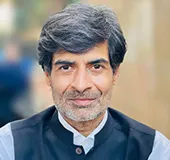
Long at the margins of the telecom and Internet revolutions, India is today moving towards pole position on data consumption. The recently released Boston Consulting Group — The Indus Entrepreneurs (BCG-TiE) report on India's Internet economy suggests the country is the "second highest" in terms of mobile Internet adoption, clocking at 391 million users. India's digital economy, according to the same report, is expected to double its value to USD 250 billion, and contribute to 7.5% of the country's GDP in three years. Perhaps the most astonishing estimate is the projected data consumption per user: The average Indian will likely consume 7 to 10 GB per month by 2020.
Contrast this to the findings of the 2016 Ericsson Mobility Report that suggested data usage in India is slated to increase five-fold by 2021, rising to 1.4 GB per active smartphone. The five to seven times difference in projected data consumption between the Ericsson report of 2016 and the BCG-TiE one of 2017 can be attributed to a disruptive intervention and a data hungry consumer.
Jio, Reliance Industries Limited's technology startup, provided that disruptive intervention, and is perhaps the most influential driver behind the new numbers in the BCG-TiE report. The numbers, however, are only the tip of the iceberg because there are deeper transformations that await the digital sector. Four such transformations will prompt traditional telecom companies to compete and create new revenue streams that cannot rely on connectivity alone. Concurrently, they will compel Indian regulators to rethink new "rules of the game" for catalysing what is today referred to as the "platform" economy riding on dumb pipes.
The death of voice
Telecom companies should acknowledge the reality that traditional voice-based communication is now a market utility, not a luxury. "Voice" based communication companies will be pressed to invest in new infrastructure and ecosystems that meet the demand for videos and data-driven apps. In practice, this would mean investing in infrastructure, and a new cadre of experts and engineers who can not only build platforms but respond agilely to disruptive innovation taking place over such telecom infrastructure. Unless they can create this new technology ecosystem, they will perish.
An Internet of People
Unprecedented data connectivity in the hands of half a billion (and growing) Indians will create an "Internet of People", with each user signifying multiple opportunities to generate value for the platform economy. The Indian government's flagship Digital India programme is perhaps the biggest public sector effort anywhere in the world to create such an ecosystem. The "Internet of People" in turn gives rise to a major challenge: will the innovations for Indians be created and hosted in India, or will the biggest platforms all be based abroad, leaving little room for the Indian platform economy to grow?
As custodians of data, Indian businesses should build capacities for Big Data analytics, create tailored services and products for local consumers in local languages, and in the process, generate employment, unleash entrepreneurial spirits, and indeed, catalyse technology-driven social transformation.
The individual is therefore the biggest driver of India's platform economy.
In his remarks at a recent conference, the Chairman of RIL Mukesh Ambani offered a way to promote Indian entrepreneurship at the local level. If data is the new currency, he argued, businesses must aim to keep it within India. "Keep in India", as he phrased the objective, would be aimed at ensuring innovation by Indian companies at the app layer, expanding the breadth and depth of the platform economy.
Unlike iterations for data localisation made by security officials or regulators, Mr. Ambani pitched "Keep in India" as a business proposition, arguing that data is the bedrock for value generation and innovation.
Policies for the platform economy
As India moves to a 10 trillion dollar GDP by the early 2030s, the fuel of choice will be "bits and bytes". If data is indeed the new oil, how is India prepared to secure this valued commodity? Regulatory questions around cybersecurity and data protection as it relates to civilian networks in India remain woefully unaddressed. Policy debates in this space have been "principle-heavy", seeking a golden median for regulation (say, for encryption or net neutrality) that can be emulated nationally. Instead, digital economy regulation should be "function-heavy", prescribing rules of conduct for businesses and governments based on the end uses that data is deployed for.
The three-way contract between the user, service provider and app provider will determine questions like: Who shares access to data? Can service providers innovate as nimbly as small start-ups providing applications on their platforms? How should applications be priced, and should this be reflected in data tariffs? Some of these questions are already part of the ongoing debate over affordable digital access in India.
Jio is only one example of the disruption that is set to reverberate across the digital sector in India. That a company like Reliance can bring its considerable resources to bear on a digital enterprise definitely sets Jio apart from others. But the reality is that its digital infrastructure will generate little to no value for Jio, its nearest competitor or the next entrant into this sector. Innovation at the top, at the level of the platform, will expand the digital economy pie in India. Already, Jio has emerged as a big contributor to Facebook's latest quarterly revenues from Asia. How can Indian platforms avail the same benefits? It is crucial that India’s businesses, entrepreneurs and regulators train their sights on the application of data, rather than the tubes that deliver them to consumers.
A short version of this article appeared in the Economic Times.
The views expressed above belong to the author(s). ORF research and analyses now available on Telegram! Click here to access our curated content — blogs, longforms and interviews.



 Long at the margins of the telecom and Internet revolutions, India is today moving towards pole position on data consumption. The recently released Boston Consulting Group — The Indus Entrepreneurs (BCG-TiE) report on India's Internet economy suggests the country is the "second highest" in terms of mobile Internet adoption, clocking at 391 million users. India's digital economy, according to the same report, is expected to double its value to USD 250 billion, and contribute to 7.5% of the country's GDP in three years. Perhaps the most astonishing estimate is the projected data consumption per user: The average Indian will likely consume 7 to 10 GB per month by 2020.
Contrast this to the findings of the 2016 Ericsson Mobility Report that suggested data usage in India is slated to increase five-fold by 2021, rising to 1.4 GB per active smartphone. The five to seven times difference in projected data consumption between the Ericsson report of 2016 and the BCG-TiE one of 2017 can be attributed to a disruptive intervention and a data hungry consumer.
Jio, Reliance Industries Limited's technology startup, provided that disruptive intervention, and is perhaps the most influential driver behind the new numbers in the BCG-TiE report. The numbers, however, are only the tip of the iceberg because there are deeper transformations that await the digital sector. Four such transformations will prompt traditional telecom companies to compete and create new revenue streams that cannot rely on connectivity alone. Concurrently, they will compel Indian regulators to rethink new "rules of the game" for catalysing what is today referred to as the "platform" economy riding on dumb pipes.
Long at the margins of the telecom and Internet revolutions, India is today moving towards pole position on data consumption. The recently released Boston Consulting Group — The Indus Entrepreneurs (BCG-TiE) report on India's Internet economy suggests the country is the "second highest" in terms of mobile Internet adoption, clocking at 391 million users. India's digital economy, according to the same report, is expected to double its value to USD 250 billion, and contribute to 7.5% of the country's GDP in three years. Perhaps the most astonishing estimate is the projected data consumption per user: The average Indian will likely consume 7 to 10 GB per month by 2020.
Contrast this to the findings of the 2016 Ericsson Mobility Report that suggested data usage in India is slated to increase five-fold by 2021, rising to 1.4 GB per active smartphone. The five to seven times difference in projected data consumption between the Ericsson report of 2016 and the BCG-TiE one of 2017 can be attributed to a disruptive intervention and a data hungry consumer.
Jio, Reliance Industries Limited's technology startup, provided that disruptive intervention, and is perhaps the most influential driver behind the new numbers in the BCG-TiE report. The numbers, however, are only the tip of the iceberg because there are deeper transformations that await the digital sector. Four such transformations will prompt traditional telecom companies to compete and create new revenue streams that cannot rely on connectivity alone. Concurrently, they will compel Indian regulators to rethink new "rules of the game" for catalysing what is today referred to as the "platform" economy riding on dumb pipes.
 PREV
PREV


